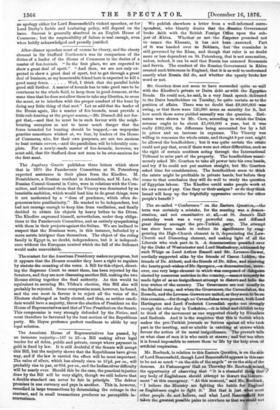The Augsburg Gazette publishes three letters which show that in
1870 the Panslavonic Committee at St. Petersburg expected assistance in their plans from the Khedive. M. Nemtchinow, a Russian resident in Alexandria, and M. Lex, the Russian Consul-General in Cairo, were in relations with the Com- mittee, and informed them that the Viceroy was dominated by an insatiable ambition, which would lead him to do great things, were it not moderated by a "dose of prudence, which often de- generates into pusillanimity." He wanted to be independent, but had not courage enough to keep him from vacillation, and finally decided to obtain his objects by heavy bribes to the Divan. The Khedive expressed himself, nevertheless, under deep obliga- tions to the Panslavonic Committee, and as entirely sympathising with them in their projects against the Sultan. We are inclined to suspect that the Russians were, in this instance, befooled by a more astute intriguer than themselves. The object of the ruling family in Egypt is, no doubt, independence, but it is independ- ence without the European control which the fall of the Sultanet would make unavoidable.


































 Previous page
Previous page